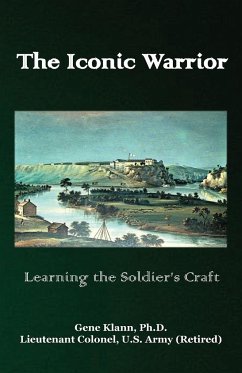
The Iconic Warrior
Combat in the Philippine Islands
Versandkostenfrei!
Versandfertig in 1-2 Wochen
24,99 €
inkl. MwSt.
Weitere Ausgaben:

PAYBACK Punkte
12 °P sammeln!
The Iconic Warrior series are fast moving, informative historical fiction novels describing the combat experiences and exploits of protagonist Jean-Paul DeBert. From his youth Jean-Paul, or J.P. as he is also known, dreamt about becoming a great battlefield warrior. The series begins in 1898 with his passage from raw civilian recruit to battle hardened veteran beginning with his acceptance into the U.S. Army's First Volunteer Cavalry, aka Teddy Roosevelt's Rough Riders. The primary objective of the series is to promote and enhance professionalism in the military and specifically, in the United...
The Iconic Warrior series are fast moving, informative historical fiction novels describing the combat experiences and exploits of protagonist Jean-Paul DeBert. From his youth Jean-Paul, or J.P. as he is also known, dreamt about becoming a great battlefield warrior. The series begins in 1898 with his passage from raw civilian recruit to battle hardened veteran beginning with his acceptance into the U.S. Army's First Volunteer Cavalry, aka Teddy Roosevelt's Rough Riders. The primary objective of the series is to promote and enhance professionalism in the military and specifically, in the United States Army. A secondary objective is to inform with words and images those who have limited knowledge of the military and military history. The book describes the thoughts, emotions, culture, and environment of military service-both in peacetime and in war. The battlefield is indeed the workshop of all iconic warriors! The books are aimed at producing military professionals like George Washington, Matthew Ridgway, and Joshua Chamberlain and to avoid the likes of Attila the Hun, Tamerlane, Genghis Khan, or Vlad the Impaler. These books also endorse the notion that the nobility of a constitutional republic are the men and women of its military who are called to ensure its safety, security, and survival. When they take the oath to the U.S. Constitution, they are essentially saying that the supporting and defending the Constitution is more important than their life. Military members are truly the aristocratic class of our nation and deserve the eternal gratitude of all their countrymen. The historical events described in this series are from primary, original sources. The entire series faithfully follows the actual sequence of the wars, campaigns, and battles it describes. The fictional portion is that the protagonist of the series, i.e., the main character, Jean-Paul DeBert, and many (but not all) the characters in the series are fictitious. The books are not historically revised or rewritten based on the trends of the current culture. Consequently, they are not teleological presentism which looks at the past through the lens of current moral, social, or political judgments.














